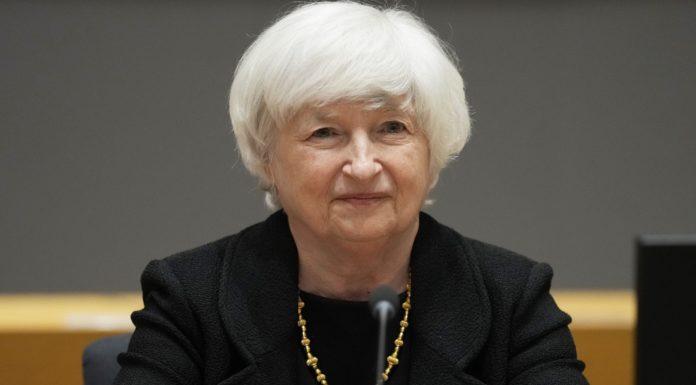(Jason Cohen, Daily Caller News Foundation) Treasury Secretary Janet Yellen’s recently announced policy to safeguard all uninsured deposits at failing banks deemed to be a “systemic risk” to the U.S. economy would destroy smaller financial institutions while simultaneously bailing out Chinese depositors, experts told the Daily Caller News Foundation.
Yellen, alongside the Federal Deposit Insurance Corporation and Federal Reserve, announced Sunday that all uninsured depositors who held accounts at the now-defunct Silicon Valley Bank (SVB) and Signature Bank would be fully covered, adding that “decisive actions” were needed to “protect the U.S. economy.” SVB was particularly popular among Chinese tech startups, as it provided easy access to U.S. investor funding, CNBC reported.
SVB’s stock collapsed last week amid numerous customer bank runs following the institution’s disclosure of a $1.8 billion net loss on asset sales on the back of high interest rates, forcing regulators to shut down the bank. Just two days later, Signature Bank, a premier lender in the crypto space, was closed by regulators due to “systemic risks,” CNBC reported.
A bailout of uninsured depositors at the collapsed banks benefits the Chinese Communist Party at taxpayers’ expense and could lead to stricter regulatory controls that smaller U.S. banks would be unable to withstand, experts told the DCNF.
“It’s absolutely atrocious that we are yet again, using taxpayer money to bail out the CCP,” E.J. Antoni, research fellow for Regional Economics at The Heritage Foundation’s Center for Data Analysis, told the DCNF. “And so now whenever the government has these knee-jerk reactions, we end up sending dollars where the American people would not like them to go.”
During COVID-19, when the government authorized sending Payment Protection Program loans and unemployment payments, it also distributed taxpayer dollars to individuals in China, Antoni told DCNF. “Anytime the government spends money, they’re by definition spending taxpayer dollars … So taxpayers are ultimately on the hook for all of this.”
In 2012, SVB launched a joint venture with Shanghai Pudong Development Bank (SPDB), resulting in the creation of SPD Silicon Valley Bank Co., CNBC reported. The venture was focused on providing services to tech startups.
Additionally, in the wake of the SVB collapse, lawmakers may seize on the chance to create a restrictive regulatory environment that “small community banks are just not going to be able to withstand,” according to Alfredo Ortiz, president and CEO of the Job Creators Network.
Unlike big banks, smaller financial institutions face greater scrutiny from regulators, Anne Balcer, Independent Community Bankers of America senior executive vice president and chief of Government Relations and Public Policy, told the DCNF.
“There’s almost a disproportionate or heightened scrutiny on the smaller institutions,” Balcer said. “Regulators keep a much tighter leash on the community banks, which is ironic,” because they are less risky than banks like SVB.
While many startups scrambled to make payroll and retrieve funds in the wake of SVB’s collapse, others benefitted from the wreckage by seeking willing financial service providers to open up lines of credit with, The New York Times reported. Brex, a financial service provider that specifically caters to startups, created an “emergency bridge line of credit” for companies fleeing the collapse, reportedly resulting in billions of dollars in deposits from thousands of companies.
Designating the banks as a “systemic risk” to the U.S. economy is “arbitrary,” Dr. Thomas Hogan, senior research faculty at the American Institute for Economic Research and former chief economist for the Senate Committee on Banking, Housing and Urban Affairs, told the DCNF.
“[A] funny thing about this is just the completely arbitrary nature of this designation,” Hogan said. “Clearly, these banks aren’t actually systemically important. This is only being done as a bailout for the uninsured depositors.”



